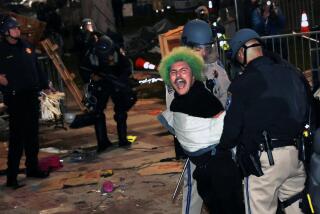King Jury May Hear New Expert on Use of Force
- Share via
Federal prosecutors expect to call one of the nation’s foremost experts in the use of police force as part of their rebuttal case against four Los Angeles police officers accused of violating Rodney G. King’s civil rights, according to a government witness list obtained Friday.
James J. Fyfe, a professor of criminal justice at Temple University and a longtime critic of the Los Angeles Police Department, appears on a list of 14 possible government witnesses obtained by The Times. An associate of Fyfe’s who has spoken with him about his possible testimony said he expected that Fyfe would be called to counter a Los Angeles police sergeant who defended every blow on the videotape of the King beating.
Fyfe served on the New York Police Department for 16 years, working as a patrolman, sergeant and lieutenant. He also taught at the Police Academy. More recently, he co-authored a highly acclaimed study of police tactics titled “Above the Law: Police and the Excessive Use of Force.”
The cover of that book features a frame from the videotape of the King incident, and the authors are scathingly critical of the officers who beat King. “The brutality of Rodney King’s beating was self-evident to everyone who watched it,” the authors wrote.
Although prosecutors will not comment on their case, Assistant U.S. Atty. Steven D. Clymer told U.S. District Judge John G. Davies on Thursday that one of the prosecution’s witnesses was flying in from the East Coast to testify next week. Fyfe was in New York on Friday delivering a lecture on hostage procedures, but his associate and co-author, Jerome H. Skolnick, confirmed that Fyfe has been contacted about appearing as a witness in the King case.
Fyfe has appeared as an expert witness in several brutality lawsuits filed against the Los Angeles Police Department. This time, he is likely to be called to counter the defense’s main use-of-force expert, Sgt. Charles L. Duke Jr., who testified that every blow against King was “reasonable and necessary” to subdue him.
Duke said that three of the four defendants--Stacey C. Koon, Laurence M. Powell and Timothy E. Wind--were within department policy when they used force against King. Powell and Wind struck King with batons and Wind kicked him several times, but Duke said every one of those blows was justified by King’s apparent attempts to get up off the ground.
“If the officer were to allow this suspect to rise . . . it could escalate into a deadly force situation,” Duke said during his testimony last month. “The safest place for him (King), and it may very hard to understand, is on the ground.”
Duke did not testify about Theodore J. Briseno’s actions, most notably a stomp that he delivered to King’s upper body. Duke has previously indicated that he believed that the stomp was a violation of policy, but he was not questioned about it during the federal trial.
Fyfe and Skolnick have sharply criticized the officers’ actions as well as the Police Department culture that they believe allowed brutality to flourish.
“There is no secretiveness in the Rodney G. King videotape or in the half-joking computer conversations that followed it,” Fyfe wrote in a column that appeared less than a month after the incident. “Instead, we see officers who had to be confident that their colleagues would remain silent and that their department would reject any citizen’s account of their conduct. Their great confidence is evidence that this brutality was no aberration.”
In addition to Fyfe, the government’s list of possible witnesses includes LAPD Deputy Chief Matthew V. Hunt. Hunt, who declined to comment about his possible testimony, presumably will be questioned about the training that Los Angeles police officers received in the use of the baton.
A number of other officers appear on the latest witness list--including three who have testified in the federal trial--but some of them may not be called, depending on how a dispute regarding Briseno’s state trial testimony is resolved. Prosecutors and lawyers for the officers met Friday afternoon to discuss editing some of the material out of the videotape, and they held a 40-minute conference call with Davies.
Briseno testified against his fellow officers during the state trial, and defense attorneys vigorously object to the admission of that testimony in the federal case. Briseno did not take the stand in the federal trial, nor did defendants Powell and Wind.
The meeting between opposing lawyers got off to a frosty start, as prosecutors were surprised to find that a reporter had been invited to observe the session. They objected, as did one of the officers’ lawyers, and the meeting was held in private.
Even as they wrangled with government attorneys to produce a version of the tape that could be shown to the jury Monday, defense attorneys were preparing a writ for the U.S. 9th Circuit Court of Appeals in an effort to keep the entire tape out of evidence in the federal trial. William J. Kopeny was drafting the defense brief late Friday, and defense attorneys said they expected to file it today.
John Barnett, Briseno’s lawyer from the state case, was working with Kopeny on the brief. He said lawyers would argue that introducing Briseno’s testimony at this stage of the federal trial was “fundamentally unfair and constitutionally defective.”
More to Read
Sign up for Essential California
The most important California stories and recommendations in your inbox every morning.
You may occasionally receive promotional content from the Los Angeles Times.














